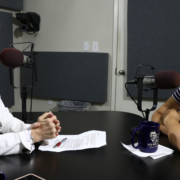September 18, 2019
Millions of student leaders have gained real-world knowledge through the program
Media contact: National Consumers League – Carol McKay, carolm@nclnet.org, (412) 945-3242 or Taun Sterling, tauns@nclnet.org, (202) 207-2832
Washington, DC–Today marks the official launch of the 2019-2020 season of LifeSmarts, with a new competition going live at LifeSmarts.org. LifeSmarts, a program of the National Consumers League (NCL), is a national scholarship competition and educational program for middle-school and high-school students that tests knowledge of real-life consumer issues and is helping to create a future generation of consumer-savvy adults.
“We are very excited to launch this season of LifeSmarts,” said national Program Director Lisa Hertzberg. “For more than 25 years, LifeSmarts has given students the skills they need to succeed as adults. We’ve seen more than 1.5 million students gain knowledge, confidence, leadership capabilities, and team-building skills. The competition is fun, and the impact of LifeSmarts is life-long.”
LifeSmarts focuses on five main content areas:
- consumer rights and responsibilities
- personal finance
- technology
- health and safety
- and the environment
Students are quizzed on their knowledge of these subject areas during online competition. Top-performing teams then advance to statewide competitions, and state champion teams as well as several wildcard teams advance to the national championship held each year in a different American city. The 2020 National LifeSmarts Championship will take place in the Washington, DC area April 25-28, 2020. Winning team members receive scholarships and other prizes.
Last year, students answered more than 3.5 million consumer questions about credit reports, recycling, nutrition, social media, state lemon laws, and everything in between. In April, the LifeSmarts state champion team from Barrington, Rhode Island, took home top honors at the 25th anniversary event in Orlando, Florida.
In addition to online, state, and national competitions, LifeSmarts recognition and awards occur throughout the program year:
- Teams of students vie for cash prizes in the online TeamSmarts quiz, which focuses on a specific LifeSmarts content area each month from September through February.
- Classroom mentor programs: Five $1,000 scholarships are awarded each winter to winning LifeSmarts students who become Safety Smart Ambassadors, using LifeSmarts content and UL’s Safety Smart modules to present safety messages to younger children in their communities.
- Partnering with FBLA (Future Business Leaders of America), 4-H, and FCCLA (Family, Career, and Community Leaders of America), LifeSmarts complements these organizations’ projects, judging events, competitive events, and activities. LifeSmarts offers special opportunities for members of these student leadership organizations.
- A new quest is open for middle school participants focusing on lithium ion button cell batteries and the risks and hazards they pose to young children. This team-building and leadership opportunity will culminate in a PSA contest among middle school LifeSmarts This project is sponsored by UL’s XPLORLABS, which helps students and teachers solve problems through science and engineering to become part of the movement to make the world a safer place.
- Thanks to a long-standing partnership with Western Union, high school LifeSmarts participants have the opportunity to educate older citizens to avoid fraud. These LifeSmarts Fraud Ambassadors will highlight common advance-fee and fake check scams, demonstrating that education is the best protection against fraud.
- A LifeSmarts student will win a $2,000 scholarship by writing the winning privacy essay in a contest sponsored by ITRC and CyberScout.
LifeSmarts is active in all states and the District of Columbia, where NCL is headquartered.
“We are proud of the impact LifeSmarts has made in its 25+ years of educating teens, and we are excited to continue to grow the LifeSmarts program, to educate students about financial literacy, and to create a new generation of savvy, market-ready consumers and workers,” said NCL Executive Director Sally Greenberg. “Too often traditional high school curriculum fails to teach students vital information that will be crucial once students go to college, get their first job, or move out of their parents’ house.”
In addition to hosting the official LifeSmarts competition, LifeSmarts.org provides resources for educators to supplement existing lesson plans. These include daily quizzes, educational videos, social media competitions, focused study guides, and scholarship opportunities. LifeSmarts lessons closely align with courses taught in family and consumer sciences, business, technology, health, and vocational education. Math and English teachers have also had success with LifeSmarts, as have homeschool and community educators.
Major LifeSmarts contributors include: Underwriters Laboratories (UL), Western Union, AARP, Comcast NBCUniversal, Sears Consumer Protection and Education Fund, American Express, Intuit, WSECU, CBM Credit Education Foundation, and a number of state and local sponsors.
Visit LifeSmarts.org for more information.
###
About LifeSmarts
LifeSmarts is a program of the National Consumers League. State coordinators run the programs on a volunteer basis. For more information, visit: LifeSmarts.org, email lifesmarts@nclnet.org, or call the National Consumers League’s communications department at 202-835-3323.
The National Consumers League, founded in 1899, is America’s pioneer consumer organization. Our mission is to protect and promote social and economic justice for consumers and workers in the United States and abroad. For more information, visit www.nclnet.org.
















